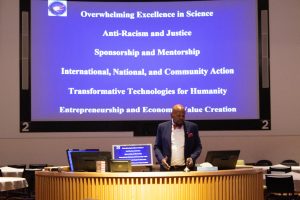Congrats to our Year Two YIIP Students :
Romoye Sohan
University Of Connecticut
B,S; Biological Sciences
Stephanie Chinwo
University Of Connecticut
B,S; Biological Sciences
Sandro Cloiseau
University Of Connecticut
B,S; Biological Sciences
Congrats to our Year Two YIIP Students :
Romoye Sohan
University Of Connecticut
B,S; Biological Sciences
Stephanie Chinwo
University Of Connecticut
B,S; Biological Sciences
Sandro Cloiseau
University Of Connecticut
B,S; Biological Sciences
On March 28 Dr. Cato T. Laurencin, the University Professor and Albert and Wilda Van Dusen Distinguished Endowed Professor at the University of Connecticut, received the 2023 Priestley Medal. This is the highest honor of the American Chemical Society. He was honored “for pioneering, breakthrough work on polymeric materials and polymer composites for biologic use, and for leadership in inclusion, diversity, equity, anti-racism and learning (IDEAL).”
In chemistry and materials science, Laurencin is a pioneer in polymeric materials chemistry, and polymeric materials science engineering for musculoskeletal systems. He produced seminal research work and discoveries in patents and papers on polymeric nanofiber technology, ushering in the field of polymeric nanomaterials for tissue regeneration. His work in published papers and patents focusing on polymer-ceramic systems inspired the development of biocomposite materials including interference screws for which he was named “One of the 100 Engineers of the Modern Era” by the American Institute of Chemical Engineers at their centennial celebration. Fundamental research on polymeric fiber system for soft tissue regeneration has led to a number of soft tissue regenerative systems including the Laurencin-Copper (LC) bioengineered anterior cruciate ligament, now in humans. His work on engineered materials for soft tissue regeneration was highlighted by National Geographic Magazine in its “100 Scientific Discoveries that Changed the World” edition. He has worked with industry on the development and understanding of systems combining polymeric materials and allograft human tissue, creating technologies helping patients throughout the world.
Read the full article: https://today.uconn.edu/2023/03/dr-cato-t-laurencin-awarded-by-the-american-chemical-society-receiving-the-2023-priestley-medal/
Professor Cato T Laurencin was invited to the Vatican to meet with Pope Francis and to discuss his work on Regenerative Engineering. During the visit. Dr. Laurencin gave Pope Francis an honorary Cato T. Laurencin Regenerative Engineering Founder’s Award Medal.
This medal, endowed by the Regenerative Engineering Society and the American Institute of Chemical Engineers Foundation, recognizes leadership in the science and practice of convergence research as applied to regeneration.
Dr. Laurencin has made seminal contributions to tissue regeneration, biomaterials science, and nanotechnology. He founded the field of regenerative engineering and has been considered to be the foremost engineer-physician-scientist in the world. His groundbreaking achievements have led to important advances in improving human life. He is the first surgeon to be elected to the National Academy of Sciences, the National Academy of Engineering, the National Academy of Medicine and the National Academy of Inventors. During his visit to the Vatican, Dr. Laurencin provided an important lecture on the field of Regenerative Engineering. He discussed the Hartford Engineering a Limb project aimed at addressing the grand challenge of whole limb regeneration. Laurencin is the University Professor and Albert and Wilda Van Dusen Distinguished Endowed Professor of Orthopaedic Surgery at the University of Connecticut.

We are excited to announce a new institute. It is entitled The Cato T. Laurencin Institute for Regenerative Engineering. “This initiative is only one of the countless number of Dr. Laurencin’s contributions to the development of science and engineering”, says Provost Anne D’Alleva.
Regenerative engineering is a field founded by Professor Cato T. Laurencin. It is described as the convergence of advanced materials sciences, stems cell science, physics, developmental biology, and clinical translation for the regeneration of complex tissues and organ systems. The Cato T. Laurencin Institute for Regenerative Engineering represents a transdisciplinary effort at UConn with a focus on the musculoskeletal area. The Institute integrates medicine, engineering, surgery, biology, physics, chemistry, and statistics/machine learning to enable a powerful platform for addressing scientific and medical problems in the regeneration and healing of complex tissues, organs, or organ systems.
The Cato T. Laurencin Institute of Regenerative Engineering holds to the pillars developed for the first Cato T. Laurencin Institute, namely:
Excellence in Science
Anti-Racism and Justice
Sponsorship and Mentorship
International, National, and Community Action
Transformative Technologies for Humanity
Economic Value Creation
In addition to this endeavor, Dr. Laurencin has created a ground-breaking project. It is entitled, Cato T. Laurencin Innovative Convergence Ventures (CTLICV). The CTLICV invests in next-generation companies based on innovative research conducted created within the Institute and its collaborating partners across UConn and greater university and corporate communities. We seek strong co-investor syndicates to develop products across a range of categories including regenerative engineering, drugs, devices, diagnostics, and digital health. The intent is to fast-track innovative research from bench to bed, with measurable impact on public health, quality of life, reducing societal disparity, and economic development.
CTLICV’s investments are directed at the seed and Series A stages, where it attracts capital and talent into the most difficult-to-fund phase of company development. When we invest, we expect to support each portfolio company through its entire financing lifecycle. We leverage the portfolio investment activity and internal/external relationships to further the mission vision and values of the Institute. Additionally, the fund taps into our experience in starting and growing companies, our expertise in the medical industry, and our network of scientific and business talent to build great companies.
The scientific and educational opportunities being pursued now and in the future at UConn will enable innovation and problem-solving beyond conventional academic boundaries. A core mission of UConn is precisely to foster new ways of thinking and new approaches to answers in medicine, science, engineering, and technology. We invite you to engage with us as we continue our work here at UConn.


UConn Health’s Dr. Gualberto Ruaño Appointed Chair of CASE’s Broadening Participation, Equity, and Inclusion Committee. For three decades Dr. Gualberto Ruaño has been an innovator in biotechnology and a pioneer in personalized medicine.
Read the full article here: https://today.uconn.edu/2023/02/uconn-healths-dr-gualberto-ruano-appointed-chair-of-cases-broadening-participation-equity-and-inclusion-committee/
This January UConn’s Dr. Cato T. Laurencin visited St. Lucia where he bestowed the first struck medal Cato T. Laurencin Regenerative Engineering Founder’s Award to St. Lucia’s Prime Minister Philip J. Pierre in honorary recognition of his support of regenerative engineering in the country.
The University of Connecticut Professor Cato T. Laurencin, CEO of the Connecticut Convergence Institute at UConn Health, met with the Prime Minister of St. Lucia during a January 18- 22 trip to the country.
Dr. Cato T. Laurencin, CEO of the Connecticut Convergence Institute met with officials again in St. Lucia to finalize the signing of the charter for the JUMP program. This partnership with Saint Lucia has launched ‘UConn JUMP Saint Lucia’ to educate Saint Lucian communities. This will provide more control over their food system, and opportunities for families and youth to establish new eating habits. This initiative will improve the quality of life for the Saint Lucian population.
Based on the community health promotion experiences and successes in the UConn JUMP program in the United States, Dr. Laurencin advised a plan to partner with various community organizations and Sir Arthur Community College.
Laurencin also had the honor of giving the Honorable Philip J. Pierre, Prime Minister of St. Lucia a Cato T. Laurencin Founders’ Award medal. The award recognizes individuals in the field that have demonstrated leadership in the science and practice of convergence research as applied to regenerative engineering and medicine. The Prime Minister received this as a gift for contributing his help to regenerative engineering.
Read the full article here: https://today.uconn.edu/2023/01/dr-cato-t-laurencin-meets-with-st-lucia-prime-minister-to-review-progress-of-uconn-st-lucia-cooperation-agreement/
The Engineering Research Visioning Alliance (ERVA), an initiative of the National Science Foundation, recently published a report identifying research priorities found at the intersection of biology and engineering. The report entitled “8 Impossible Things” boldly presents challenges to humankind that may be solved through engineering combined with biology.
Cato T. Laurencin, M.D., Ph.D., University Professor, Albert and Wilda Van Dusen Distinguished Endowed Professor of Orthopaedic Surgery, and Professor of Biomedical Engineering, Materials Science, and Chemical Engineering at UConn, co-lead the project with Jake Beal, engineering fellow, Raytheon BBN Technologies.

Dr. Laurencin’s background bridges engineering and biology. He received his B.S.E. in chemical engineering from Princeton University, his M.D., Magna Cum Laude from the Harvard Medical School and his Ph.D. in Biochemical Engineering/Biotechnology from M.I.T. He received the Pierre Galletti Award, the highest honor of the American Institute for Medical and Biological Engineering, and the Robert A. Pritzker Distinguished Lecture Award, the premier recognition of the Biomedical Engineering Society.
He is the first surgeon to be elected to the National Academy of Engineering, the National Academy of Medicine, the National Academy of Sciences, and the National Academy of Inventors. He has received the Presidential Faculty Fellow Award from President Bill Clinton, and the National Medal of Technology and Innovation from President Barack Obama for his work bridging engineering and biology in ceremonies at the White House.
The full report and executive summary can be found here: https://www.ervacommunity.org/visioning-report/leveraging-biology-visioning-report/
Stephanie Chinwo received the 2022 American Society for Bone and Mineral Research (ASBMR) Young Investigator Award for her abstract presentation Molecular Analysis of AMBRA1 as a Candidate Tumor Suppressor in Sporadic Parathyroid Adenomas. She accepted a commemorative plaque and honorarium during an ASMBR President’s Reception at the Annual Meeting held in September 2022 at Austin TX. ASBMR is a professional, scientific and medical society established to bring together clinical and experimental scientists who are involved in the study of bone and mineral metabolism.
The historic inaugural symposium was held on October 12 –14 in Nairobi, Kenya.
–
Last week Professor Dr. Cato T. Laurencin had the honor of opening the First U.S.-Africa Frontiers of Science, Engineering, and Medicine Symposium in Nairobi, Kenya.
Laurencin served as a distinguished member of the oversight committee for the symposium and represented the United States at the meeting.
“This is a project I have been committed to for a number of years and it is wonderful to see this occur. I want to thank and congratulate Dr. Felix Dakora (African Academy of Sciences) and Dr. John Hildebrand (National Academy of Sciences) for their leadership,” stated Laurencin.
This inaugural symposium was held on October 12 – 14, and was a partnership between The U.S. National Academies of Sciences, Engineering, and Medicine (NASEM) and the African Academy of Sciences (AAS).
–
Read the full article here: https://today.uconn.edu/2022/10/uconns-dr-cato-t-laurencin-participates-in-first-u-s-africa-frontiers-of-science-engineering-and-medicine-symposium/
Dr. Ezra Griffith of Yale University was honored with the Cato T. Laurencin M.D., Ph.D. Lifetime Research Award at the opening ceremonies of the 2022 National Medical Association (NMA) national meeting.
This award recognizes an individual who has demonstrated more than 20 years of consistent, long-lasting contributions to benefit African Americans and to reduce health disparities through recognized research and inquiry. The individual may be a physician, a career researcher or a distinguished educator who has enhanced the field of research and made it possible for young researchers to be successful.
Cato T. Laurencin has dedicated his life to excellence in research, teaching, surgery, mentoring, and community service. Dr. Laurencin has had a prolific career in science, but also in service to his community and certainly in service to the NMA.
Read the full article here:EG-Cato-T-Laurencin-MD-PhD-lifetime-research-award-Press Release (002)